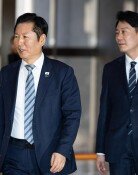[Opinion] Acknowledgement
There is a civilization critique who divided the social psychological traits of Koreans and Japanese into unyielding pride and cleanness, respectively. In other words, Koreans do no easily acknowledge their defeats because their tenacity easily translates into unyielding pride, while the Japanese accept their defeats once they submit to them even if they resisted by self-disembowelment. There is also an analysis that the Japanese repressed Koreas independence movements in such a brutal way because of their antipathy to the unyielding pride of Koreans. Paradoxically speaking, it might be possible to say that Gandhis principle of nonresistance could never be forgiven if the Japanese ruled India.
What Occupation Forces Commander MacArthur, who reigned over post-war Japan, feared most was the extreme resistance of the Japanese, reckless enough to crash into U.S. warships with kamikaze. The reason he decided to keep the system of emperor also was to pacify the Japanese public opinion. Nevertheless, the Japanese turned into docile lambs and accepted the rule of the U.S. military forces all of a sudden. In addition, prostitutes who first started working for American soldiers did not seek revenge, and the society did not treat them as Yankee princesses.
In that perspective, Americans respect rules, a social consent for various races and historical traditions to live in harmony. This is well shown in the dueling culture of gunmen in the age of cultivation of the West. The duel is a tradition of deciding victory or defeat whereby each gunman, having his back against the other and holding his pistol, walks five or 10 steps forward and turns back and shoots. It is impossible to imagine a foul in which a gunman turns back first and shoots. There is even a movie where the bad guys father shoots down his own son first when he tried to shoot in the back of his opponent.
After being re-elected under various hardships, President George W. Bush called for national integration, saying, Senator John Kerry called and we had a really good phone call. Kerry also declared, The election outcome should be decided by voters, not a protracted legal process. Today I hope that we can begin the healing. The defeated appears more beautiful than the winner. This is a moving political event that confirmed the democratic tradition and power of the United States. Is it because of the Koreans unyielding pride? Some Koreans still seem reluctant to accept the outcome of the U.S. presidential election even though the person concerned himself is acknowledging the defeat. And acknowledgement does not mean surrender.
Oh Myung-chul, Editorial Writer, oscar@donga.com







